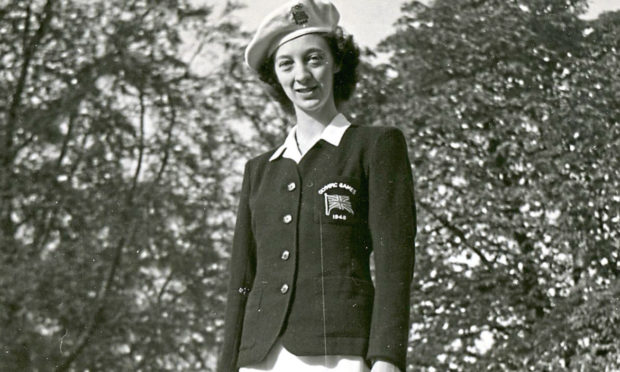When Elgin’s Margaret Erskine set off for Birmingham in 1947 to take up a post with Cadbury’s chocolate company at its Bournville factory near Birmingham, she could never have imagined she was on the cusp of becoming a Scottish athletics trailblazer.
She was 22 at the time, having spent the previous two years as a probationary teacher at Keith Grammar School after graduating from Dunfermline College of Physical Education, which had been relocated to Aberdeen for the duration of the Second World War.
Less than a year after arriving in the Midlands, Erskine became the first Scottish female track and field athlete to compete in the Olympic Games, representing Great Britain in the long jump at London’s Wembley Stadium in 1948.
Although failing to reach the final, it was still a proud moment and capped an impressive season. Erskine was selected after finishing second in that year’s WAAA championships at the White City, clearing a personal best of 5.55 metres. It was a Scottish record which would last until 1959.
The following year, she became the first Scot to win a WAAA title and she defended the crown in 1950 before taking bronze in 1951.
Among her other accomplishments were a sixth-place finish at the 1950 European championships in Brussels and two more outings for Great Britain.
She perhaps flew under the radar in Scotland, both then and now, because her successes came when she was based in the Midlands.
She appeared to have enjoyed her time with Cadbury’s. The company provided a wide range of leisure and recreational activities for its employees and Erskine was based in the PE department. She competed for the company team, Bournville Works Girls Athletic Club, and for Birmingham Atlanta AC.
Her son David Luckas, who now lives in the Assynt area, recalls that Cadbury’s were very supportive of his mother’s athletics career.
He said: “They gave her time off to go to competitions and even built a long jump pit at Bournville for her to use.
“She was involved in many sports activities there and sometimes took the factory girls away on trips throughout Britain and even overseas.”
Luckas revealed that his mother was born in Hampshire where her father, a Fifer, was based with The Black Watch. She was an infant when the family moved to Moray, firstly to Lossiemouth then Elgin. She was a sports champion at Elgin Academy and continued her interest at college in Aberdeen before heading south.
Erskine appears to have retired from competing just before her marriage in 1953 to childhood sweetheart Stanley Luckas, who lived in the same street in Elgin when they were at school.
Stanley, a doctor, died in 1963, aged 36, when he was working with an electric drill in the house they had just moved into in Yorkshire. The wiring was faulty and he was electrocuted.
It was a devastating tragedy as the couple had two young children at the time, David and Jennifer. They moved back to Elgin where her parents and extended family could offer support.
Erskine subsequently worked as a peripatetic PE teacher covering primary schools across the Moray area. She died in 2006, aged 80.
Erskine took on Dutch athletics great
Margaret Erskine was privileged during her athletics career to compete against Fanny Blankers-Koen, who was widely considered to be the greatest female athlete of the 20th Century.
Blankers-Koen, from the Netherlands, was the undoubted star of the 1948 London Olympic Games, winning gold medals in the 100m, 200m, 80m hurdles and 4x100m relay.
She was also a world record-holder for the long jump, the event in which Erskine represented Great Britain at the Games, but the Dutch woman couldn’t fit that into her busy schedule.
However, Blankers-Koen and Erskine did go head-to-head in early summer 1950, competing in the 100 yards at the Coventry Godiva sports.
The Olympic champion was in outstanding form, equalling her British all-comers record when posting a time of 11.9 secs, while Erskine finished third.
A couple of months later, they were both on duty at the European championships in Brussels where Blankers-Koen pocketed another three gold medals – in the 100m, 200m and 80m hurdles. She also earned silver in the 4x100m. Erskine was sixth in the long jump.
Blankers-Koen was without question a remarkable athlete. Her quadruple success at the first post-war Olympics is credited with helping promote more widespread participation by women in sport.
She was 30 years old at the time and a mother of two, earning her the nickname of “The Flying Housewife”.
